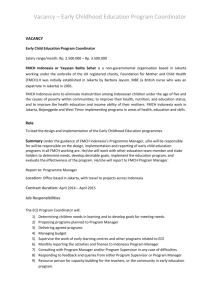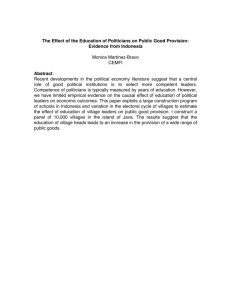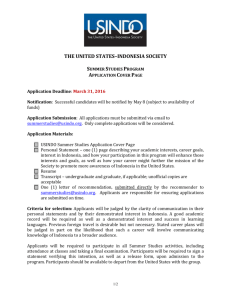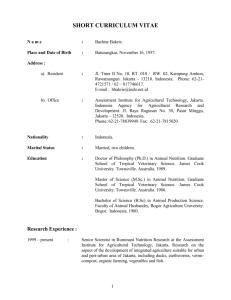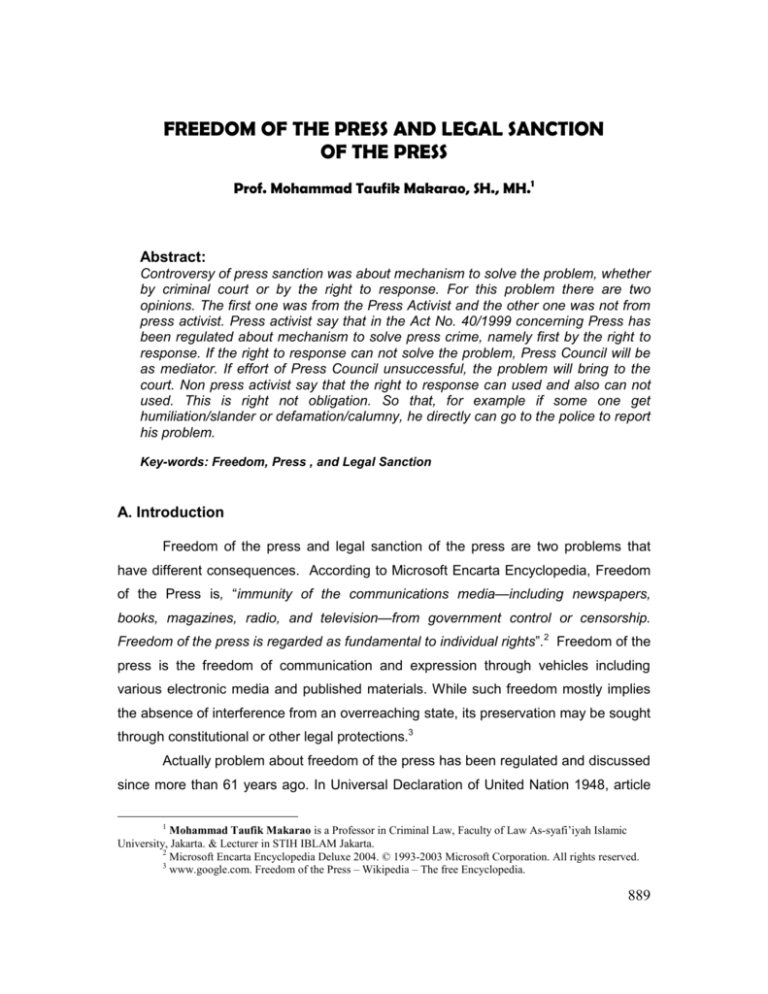
FREEDOM OF THE PRESS AND LEGAL SANCTION
OF THE PRESS
Prof. Mohammad Taufik Makarao, SH., MH.1
Abstract:
Controversy of press sanction was about mechanism to solve the problem, whether
by criminal court or by the right to response. For this problem there are two
opinions. The first one was from the Press Activist and the other one was not from
press activist. Press activist say that in the Act No. 40/1999 concerning Press has
been regulated about mechanism to solve press crime, namely first by the right to
response. If the right to response can not solve the problem, Press Council will be
as mediator. If effort of Press Council unsuccessful, the problem will bring to the
court. Non press activist say that the right to response can used and also can not
used. This is right not obligation. So that, for example if some one get
humiliation/slander or defamation/calumny, he directly can go to the police to report
his problem.
Key-words: Freedom, Press , and Legal Sanction
A. Introduction
Freedom of the press and legal sanction of the press are two problems that
have different consequences. According to Microsoft Encarta Encyclopedia, Freedom
of the Press is, ―immunity of the communications media—including newspapers,
books, magazines, radio, and television—from government control or censorship.
Freedom of the press is regarded as fundamental to individual rights‖.2 Freedom of the
press is the freedom of communication and expression through vehicles including
various electronic media and published materials. While such freedom mostly implies
the absence of interference from an overreaching state, its preservation may be sought
through constitutional or other legal protections.3
Actually problem about freedom of the press has been regulated and discussed
since more than 61 years ago. In Universal Declaration of United Nation 1948, article
1
Mohammad Taufik Makarao is a Professor in Criminal Law, Faculty of Law As-syafi’iyah Islamic
University, Jakarta. & Lecturer in STIH IBLAM Jakarta.
2
Microsoft Encarta Encyclopedia Deluxe 2004. © 1993-2003 Microsoft Corporation. All rights reserved.
3
www.google.com. Freedom of the Press – Wikipedia – The free Encyclopedia.
889
19 says that: ―Everyone has the right to freedom of opinion and expression; this right
includes freedom to hold opinions without interference and to seek, receive and impart
information and ideas through any media and regardless of frontiers‖.4 Article 28 E
The 1945 Constitution of the Republic Indonesia after amendment to confirm: ….‖(2)
Every person shall have the right to the freedom to believe his/her faith, and to express
his/her views and thoughts, in accordance with his/her conscience. (3) Every person
shall have the right to the freedom to associate, to assemble and to express opinions‖.5
Article 28F ―Every person shall have the right to communicate and to obtain information
for the purpose of the development of his/her self and social environment, and shall
have the right to seek, obtain, possess, store, process and convey information by
employing all available types of channels”.6
Also in one of the consideration of the Act No.40/1999 concerning Press says:
―(a) that the freedom of the press is one of the many embodiments of the sovereignty
of the people and is the utmost important element in creating a democratic society,
nation and state in order to insure the freedom of expressing ideas and opinions as
stated in Article 28 Indonesian Constitution of 1945‖.7 In article 2 the Act No. 40/1999
to arrange: ―The freedom of the press is one of the embodiments of the sovereignty of
the people based upon democratic, justice, and law supremacy principles‖.8 Article 4
to organize: ―(1) the freedom of the press is guaranteed as the basic human rights for
every citizen‖.9
B. Legal Sanction of the Press
Legal sanction of the press or criminal provision of the press correlation with
sanction or punishment towards activities in media communication such as newspaper,
magazine, radio, and television. In Indonesia there are some acts or law which to
regulate about legal sanction or criminal provision correlation with the press. These
acts are: Act No. 1/1946, in article 14 (1) and (2), and article 15; Act No. 40/1999
4
www. Google.com. http://www.un.org./en/documents/udhr/
www.Google.com. The 1945 Constitution of the Republic Indonesia.
6
Ibid.
5
7
Act No.40/1999 concerning Press in Appendix of Anneli Ström Leijel, The New Press Law in Indonesia
– Just a paperwork or a real step towards more freedom of the press?. Malmö Högskola Department of Culture and
Communication Communication for Development, April 2002, p.81.
8
9
Ibid., p.83.
Ibid.
890
concerning Press, Penal Code of Indonesia, Civil Code of Indonesia. This paper will
try to explore these acts with some examples.
1. Act No.1/1946.
In this act, article 14 says that: ―1) anybody who broadcasts/publishes a false
story or press release/announcement, with the intention to cause a public disturbance,
is to be punished with a jail sentence of up to ten years. 2) Anybody who
broadcasts/publishes a story or distributes an announcement that can cause a public
disturbance, while he/she should suspect that the story is false, is to be punished with
a jail sentence of up to three years‖.10 Article 15 to stipulate: ―Anybody who
broadcasts/publishes news that is used with certainty or news that exaggerates or is
incomplete, while they understand or at least should be able to understand, that the
news will or could easily cause a public disturbance is to be punished with a jail
sentence of up to two years‖.11
As example case, in 1990 the journalist of Berita Buana Newspaper, Abdul
Wahid has been sentenced for one year to jail because broadcasts/publishes a false
story or press release/announcement. This is connection with news in that newspaper,
14 October 1988, with title ―Too much food that produced in fact to contain grease of
pig‖. Another example case, was Tomy Winata versus Tempo Magazine, 2003-2004.
Tjipta Lesmana said: In Central Jakarta District Court, Tempo claimed not only criminal
case but also civil case by Tomy Winata because news: ―There was Tomy in
Tenabang‖.12 There were three the accused namely: Bambang Harymurti as an Chief
Editor of Tempo magazine and Iskandar Ali and Ahmad Taufik as reporters.
2. Criminal Provision Based on Act No. 40/1999.
In article 18 (1) Everyone who, against the law, deliberately take action that
caused hindrance or prevention of the criteria stated in Article 4 item (2) and item
(3) will be sentenced to jail for 2 (two) years at the maximum or charged with fine of
Rp. 500,000,000.- (five hundred millions rupiahs) at the maximum. (2) Press
company who violates the criteria as stated in Article 5 item (1) and item (2), and
10
www.Google.com Act. No.1/1946.
Ibid.
12
Tjipta Lesmana, Pencemaran Nama Baik dan Kebebasan Pers, antara Indonesia dan
Amerika, Penerbit Erwin – Rika Press, Jakarta, 2005, p. 6-8.
11
891
Article 13, will be charged with fine of Rp. 500,000,000.- (five undred millions
rupiahs) at the maximum. (3) Press company who violates the criteria as stated in
Article 9 item (2) and Article 12 will be charged with fine of Rp. 100,000,000.- (one
hundred millions rupiahs).13
Article 4 (2) and (3), Act No.40/1999 to formulate: ―(2) towards national press
no censorship, prohibition or restriction of broadcasting will be imposed upon. (3)
To insure the freedom of the press, national press has the right to seek, acquire,
and disseminate ideas and information”.14 So everyone who, against the law,
deliberate takes action that caused hindrance or prevention towards press no
censorship, prohibition or restriction of broadcasting, or in other word everyone
who, make easy censorship, prohibition or restriction of broadcasting will be
sentenced to jail for 2 (two) years at the maximum or charged with fine of Rp.
500.000.000,- (five hundred millions rupiahs).
Article 5 (1) and (2), Act No. 40/1999 to confirm, ―(1) National press has the
obligation to report events and opinions with respect towards religious norms and
moral norms possessed by the public, completed with the presumed innocent
principle. (2) Press is obliged to attend to The Right to Response.‖15 Article 13 to
formulate: ―Press company is prohibited to have advertisement that: a. caused in
degrading the dignity of a certain religion and/or create disorder in the harmonious
relationships between diverse religions' followers, and contrary to the public sense
of morality; b. contains alcoholic, narcotics, psychotropic and other addictive
substances as against the statutory laws; c. show the form of cigarette and/or its
usage”.16
So if the national press did not report events and opinion with respect towards
religious norms possessed by the public, completed with the presumed innocent
principle, and also is not obliged to attend to the right to response, and to have
advertisement that: a. caused in degrading the dignity of a certain religion and/or
create disorder in the harmonious relationships between diverse religions'
13
Anneli Ström Leijel, The New Press Law in Indonesia – Just a paperwork or a real step towards more
freedom of the press?. Malmö Högskola Department of Culture and Communication Communication for
Development, April 2002, p.85-86.
14
15
16
Ibid. p.83.
Ibid. p.
Anneli Ström Leijel, Ibid., p.84
892
followers, and contrary to the public sense of morality; b. contains alcoholic,
narcotics, psychotropic and other addictive substances as against the statutory
laws; c. show the form of cigarette and/or its usage, will be charged with fine of Rp.
500,000,000.- (five hundred millions rupiahs) at the maximum.
Article 9 (2) says that: ―(2) each press company must be in the form of
Indonesian legal entity”.17 Meanwhile article 12 says that: ―Press Company is
obliged to disclose name, address, and accountable party through its own media;
particularly for publication press, it must be added with name and address of
printing company”.18 So that if each press company did not in form of Indonesian
legal entity and is not obliged to disclosure name, address, and accountable party
through its own media; particularly for publication press, it must be added with
name and address of printing company, will be charged with fine of Rp.
100,000,000.- (one hundred millions rupiahs).
3. Legal Sanction Based on Indonesian Criminal Code
(1) Article 112: ―Any person who deliberately either reveals or informs or
smuggles into the hand of a foreign power, a king or a community, documents,
news or information concerning a case of which he knows that secrecy has
been ordered by
the interest of the state, shall be punished by capital
punishment or life imprisonment or a maximum imprisonment of seven years.‖19
Article 113: ―(1) Any person who having in his possession secret documents,
maps, plans, drawings or objects relating to the defense or the external
security of Indonesia or having knowledge of the content of such secret
documents or of the form and the composition of such secret objects,
deliberately wholly or partially either reveals said documents or objects, or the
content, the form or the composition thereof, or communicate them to others or
smuggles them into the hands of others who are not authorized to take
cognizance thereof, shall be punished by a maximum imprisonment of four
years. (2) If said :documents or objects which are in his possession or of which
he has knowledge, are because of his profession, the punishment may be
17
Ibid.
Ibid.,
19
Penal Code of Indonesia, Amended by: Undang-Undang RI No. 27 Tahun 1999, Tanggal 19
Mei 1999. Edited by: Directorate General of Law and Legislation Ministry of Justice, p. 33.
18
893
enhanced with one third”.20 In practice in Indonesia these two articles above
especially at new order government as a reason to censor the press.
Unfortunately in that time which the press who to violate this article never
processed in the court.
(2) Article 134 and 137 Criminal Codes (Crimes against the dignity of the
President and Vice President)
Article 134: ―Deliberate insult against the President or Vice President shall
be punished by a maximum imprisonment of six years a maximum fine of three
hundred Rupiahs‖.21 Article 137 (This article repealed by Constitution Court No
013-022/PUU-IV/2006): ―(1) Any person who disseminates, demonstrates
openly or puts up writing or picture containing insult against the President or
Vice President with intent to make the contents public or enhance the publicity
thereof shall be punished by a maximum imprisonment of one year and four
months or a maximum fine of three hundred Rupiahs. (2) If the offender
commits the crime in his profession and during the commission of the crime two
years have not yet elapsed since an earlier conviction on account of a similar
crime has become final, he may be deprived of the exercise of said
profession‖.22 As an example case, correlation with article 137 namely:
executive editor of Rakyat Merdeka newspaper Supratman, at 27 October
2003, get punishment 6 month jail with attempt era 12 month because
disseminates, demonstrates openly or puts up writing or picture containing
insult against the President Megawati Soekarnoputeri.23 There were four news
from Rakyat Merdeka: Mega’s mouth solar smell (6-1-2003), Mega usurer ((8-12003), Mega more fierce than Sumanto (30-1-2003), Mega only same class
with regent (4-2-2003).24
20
Ibid. p. 34.
Ibid. p. 37.
22
Penal Code of Indonesia, Ibid. p. 38.
21
23
See Kompas Newspaper, 28 October 2003 edition, p. 7.
24
See Tjipta Lesmana, Pencemaran Nama Baik dan Kebebasan Pers, antara Indonesia dan
Amerika, Penerbit Erwin – Rika Press, Jakarta, 2005, hal. 1- 2.
894
(3) Article 144 (Disseminates against King or another Head of a Friendly
State)25
(1) Any person who disseminates, openly demonstrates or puts up a writing
or portrait containing an insult against a ruling king or another head of a friendly
state or against a representative of a foreign power to the Indonesian
Government in his capacity, with intent to make the insulting content public or to
enhance the publicity thereof, shall be punished by a maximum imprisonment of
nine months or a maximum fine of three hundredth Rupiahs. (2) if the offender
commits the crime in his profession and during the commission of the crime,
two years hare not yet elapsed since an earlier conviction account of a similar
crime has become final, he may be deprived of the exercise of said profession.
(4) Article 154 (Disseminates against Government of Indonesia)26
The person who publicly gives expression to feelings of hostility, hatred or
contempt against the Government of Indonesia, shall be punished by a
maximum imprisonment of seven years or maximum fine of three hundred
Rupiahs.
(5) Article 155 (Disseminates with Writing against the Government of
Indonesia)27
(1) Any person who disseminates, openly demonstrates or puts up a writing where feelings of
hostility hatred or contempt against the government of Indonesia are expressed, with intent to
give publicity to the contents or to enhance the publicity thereof, shall be punished by
a
maximum imprisonment four years and six months or a maximum of three hundred Rupiahs. (2)
If the offender commits the crime in his profession and during the commission of the crime five
years have not yet elapsed since an earlier conviction on account of a similar crime has become
final, he may be release from the exercise of said profession.
(6) Article 156a (Enmity with, Abusing or Staining a Religion)
28
By a maximum imprisonment of five years shall be punished any person who deliberately in
public gives expression to feelings or commits an act. a. which principally have the character of
being at enmity with, abusing or staining a religion, adhered to in Indonesia; b. with the intention
to prevent a person to adhere to any religion based on the belief of the almighty God. ... ..
There was some cases correlation with this article as follow:
25
Penal Code of Indonesia, Loc.cit. p. 39.
Penal Code of Indonesia. Ibid. p. 41.
27
Ibid.
28
Ibid. p. 42.
26
895
a.
Case/Victim: HB. Jasin. Short Story: ―Langit Makin Mendung‖. Sastra
Magazine, Th. VI No.8 August 1968 Edition. Decision of Judge one
year jail and attempt two years because enmity with, abusing or
staining a religion (article 156a Indonesian Criminal Code). Case
Position: One person have name Ki Panjikusmin to write short story
which the title: ―Langit Makin Mendung‖ in the Sastera Magazine, Th. VI
No. 8 August 1968 Edition which that short story to coax Islam. 29
b.
Case/Victim:
Arsewendo
Atmowiloto.
Monitor
Tabloid
Pooling.
Decision of Judge: five years jail because enmity with, abusing or
staining a religion (article 156a Indonesian Criminal Code). Case
Position: Monitor Tabloid, Monday 15 October 1990, to write result of
the polling about person who very popular among the reader. The result
of pooling show that the rank of Prophet Muhammad
was number
eleven under Arsewendo Atmowiloto, the chief editor of Monitor
Tabloid.30
(7) Article 157 (Disseminated among Group)31
Any person who disseminated, openly demonstrates or puts up a writing or
portrait where feelings of hostility, hatred or contempt against or among groups
of the population of Indonesia are expressed, with intent to give publicity to the
contents or to enhance the publicity thereof, shall be punished by a maximum
imprisonment of two years and six month or maximum fine of three hundred
Rupiahs.
(8) Article 207 (Crime against Public Authority)32
Any person who with deliberate intent in public, orally or in writing, Insults
an authority or a public body set up in Indonesia shall be punished by a
maximum imprisonment of one year and six month or a maximum fine of three
hundred Rupiahs.
29
Buletin the WAHID Institute. Agama dan Keyakinan dalam R–KUHP, Penodaan Agama
dalam Praktik Peradilan, Kerjasama The Wahid Institute—Yayasan TIFA, No. 3/Juli 2006.
30
Ibid.
31
Penal Code of Indonesia. Op.cit. p. 42.
32
Ibid. p.53.
896
As a case example: ―In 1981, the chief Editor of Sinar Pagi Newspaper, get
punishment six month jail with attempt one year by District Court of Tangerang
because with deliberate intent in public, orally or in writing, Insults an authority
or a public body set up in Indonesia. This case connection with news in that
newspaper 23 July 1980, in the headline with title: Reported in Parliament, The
Regent of Tangerang to steal people money 28 million Rupiah‖.33
(9) Article 208. (Disseminated against Authority or Public Body)34
(1) Any person who disseminates, openly demonstrates or puts up a writing
or portrait containing an insult against an authority or public body set up in
Indonesia with intent to give publicity to the insulting content or to enhance the
publicity thereof, shall be punished by a maximum imprisonment of four months
or a maximum fine of three hundred Rupiahs. (2) If the offender commits the
crime in his profession and during the commission of the crime two years have
not yet elapsed since an earlier conviction of the person on account of a similar
crime has become final, he may be deprived of said profession.
(10) Article 282 (Crimes against Decency).35
(1) Any person who either disseminates openly demonstrates or puts up a
writing of which he knows the content or a portrait or object known to him to be
offensive against decency, or produces, imports, conveys in transit, exports or
has in store, or openly or by dissemination of a : writing, unrequestedly offers or
indicates that said writing, portrait or object is procurable, in order that it be
disseminated,. openly demonstrated or put up, shall be punished by a
maximum imprisonment of one year and four months or a maximum fine of
three
thousand
rupiahs.
(2)
Any
person
who
disseminates,
openly
demonstrates or puts up a writing, a portrait or an object offensive to decency,
or produces imports, conveys in transit, exports or has in store, or openly or by
dissemination of a writing unrequestedly offers or indicates that said writing,
portrait or object is procurable, in order that it be disseminated, openly
demonstrated or put up if he has serious reasons for suspecting that the writing,
33
Bambang Sadono, Penyelesaian Delik Pers Secara Politis, Sinar Harapan, Jakarta, 1983, hal. 88.
34
Penal Code of Indonesia. Op.cit. p. 54.
Ibid. p. 67.
35
897
portrait is offensive to decency, shall be punished by a maximum imprisonment
of nine months or a maximum fine of three thousand rupiah. (3) If the offender
makes an occupation or a habit of the commission of the crime described in the
first paragraph, a maximum imprisonment of two years and eight months or a
maximum fine of five thousand rupiahs may be imposed.
There was some cases correlation with this 282 article, as Bambang Sadono36
written as follow:
a. In 1954, the Chief Editor of Rindu Medan Magazine, claimed because
the short story to contain crimes against decency.
b. In 1955, Tjermin Magazine, Surabaya claimed because news: ―Garagara buah dada terbuka‖.
c. In 1956, Chief Editor Bikini Magazine, Yogya, Tony Suprapto, get fine
punishment because short story, ―Dan Akhirnya Jatuhlah Aminah‖ .
d. In 1957, the Chief Editor Amor Magazine, Usman Ibrahim carried to the
court because his essay to violate decency.
e. In 1958, Petrus Gonie, the Chief Editor of Arena Weekly, to get fine
punishment because demonstrates portrait which to violate decency.
f.
In 1959, Bung Yuss, reporter Tjerdas Newspaper, Medan, was fined
because his opinion to violate article 282.
g. In 1963, the Chief of Editor, Liberty Magazine Goh Tjing Hok dan his
vice, M.F. Liem Hok Liong, go to the court process because his essay to
have decency element.
(11) Article 310 (Slander)37
(I) The person who intentionally harms someone’s honor or reputation by
charging him with a certain fact, with the obvious intent to give publicity thereof,
shall, being guilty of slander, be punished by a maximum imprisonment of nine
months or a maximum fine of three hundred rupiahs. (2) If this takes place by
means of writings or portraits disseminated, openly demonstrated or put up, the
principal shall, being guilty of libel, be punished by a maximum imprisonment of
one year and four months or a maximum fine of three hundred rupiahs. (3)
36
37
Bambang Sadono, Penyelesaian Delik Pers Secara Politis, Op.cit., p. 103.
Penal Code of Indonesia. Op.cit. p. 74.
898
Neither slander nor libel shall exist as far as the principal obviously has acted in
the general interest or for a necessary defense.
There was some example cases correlation with this 310 article, as follow:
a. In 1984, two newspaper namely: Mimbar Masyarakat in Samarinda and
Merdeka in Jakarta, also Detektif & Romantika Magazine in Jakarta get
sanction to pay fine each other Rp. 250.000,- and to pay expenses of
the case each other Rp. 175.000,- because slander to Fachri Doemas.38
b. In 1987, Tempo Magazine process to the court because slander based
on report of The Businessman Probosutedjo.39
c. In 1989 Terbit Newspaper process to the court because slander the
chairman of District Court of Subang (West Java).40
d. Former the chief editor Rakyat Merdeka Newspaper, Karim Paputungan
at 9 September 2003, get punishment five month jail with attempt 10
month. This correlation with caricature of chairman of Golkar Party and
also chairman of Indonesian Parliament, Akbar Tanjung, without t-shirt,
and his face full of perspiration.41
(12) Article 311 (Calumny)42
(1) Any person who committees the crime of slander or libel in case proof
of the truth of the charged fact is permitted, shall, if he does not produce said
proof and the charge has been made against his better judgment being guilty of
calumny, be punished a maximum imprisonment of four years. (2) Deprivation
of rights mentioned in article 35 first to thirdly may be pronounced.
As example case with this article 311 Penal Code of Indonesia, between
Tempo Magazine and Tomy Winata. For the first time in Central Jakarta Court
session was done in September 8, 2003, because news: ―There was Tomy in
Tenabang‖.43 There were three the accused namely: Bambang Harymurti as an
38
Tempo, edisi 7 Desember 1985; See also Bambang Sadono, Penyelesaian Delik Pers Secara
Politis,Op.cit., hal. 88.
39
Ibid.
40
Ibid.
See Tjipta Lesmana, Pencemaran Nama Baik dan Kebebasan Pers, antara Indonesia dan
Amerika, Loc.cit., p. 1.
42
Penal Code of Indonesia. Op.cit. p. 74.
43
Ibid., p. 6-8.
41
899
Chief Editor of Tempo magazine and
Iskandar Ali and Ahmad Taufik as
reporters, because to spread lie news, and geing guilty of calumny.
(13) Article 1365 and 1372 Civil Code of Indonesia Correlation with the
Press44
Article 1365 A party who commits an illegal act which causes damage to
another party shall be obliged to compensate therefore. Article 1372. The civil
legal claim with respect to an offense shall extend to compensation of damages
and to the reinstatement of good name and honor that were damaged by the
offense. The judge shall, in the consideration thereof, have regard to the
severity of the offense, also the position, status and financial condition of the
parties involved and the circumstances. There was some example correlation
with article 1365 and 1372 Civil Code of Indonesia as follow:
a. Marimutu Sinivasan the Chairman of Texmaco Group to accuse Tempo
Newspaper and Tempo Magazine because their news in January 23, 2003
and April 25, 2003 very insinuation tendency, and provocative with aim
character assassination.45
b.
Tomy Winata also to propose accusation to Tempo Inti Media Company,
Chairman of Tempo Magazine Company Zulkifli Lubis, Chief Editor
Bambang Harymurti, Chief General Fikri Jufri, Vice Chief Editor Toriq
Hadad, also reporter Ahmad Taufik, Bernada Rurit dan Cahyo Junaedi.
The subhead line of the news: rumours/gossip, Tomy Winata to get
renovation project of Tanah Abang Market 54 billion rupiah. That proposal
has been proposed before fire. According to Tomy Winata that news was
commits an illegal act which causes damage to himself.
c.
In January 20, 2004,46 Tempo Newspaper got sanction from Court of South
Jakarta. This sentence connection with news in that newspaper 6 February
2003 edition, ―Ali Mazi Bantah Tomy Winata Buka Usaha Judi‖. According
44
Civil Code of Indonesia. p. 157 & 158.
Kompas, 31 Desember 2003, hal. 17.
46
Tjipta Lesmana, Pencemaran Nama Baik dan Kebebasan Pers, antara Indonesia dan
Amerika, Op.cit, p. 6-7.
45
900
to the judge Tempo newspaper was commits an illegal act which causes
damage to another party and to slander to the accuser.
C. Conclusion and Recommendation
1. Conclusion
(1) Controversy of press sanction was about mechanism to solve the problem,
whether by criminal court or by the right to response. For this problem there
are two opinions. The first one was from the Press Activist and the other
one was not from press activist.
(2) Press activist say that in the Act No. 40/1999 concerning Press has been
regulated about mechanism to solve press crime, namely first by the right to
response. If the right to response can not solve the problem, Press Council
will be as mediator. If effort of Press Council unsuccessful, the problem will
bring to the court.
(3) Non press activist say that the right to response can used and also can not
used. This is right not obligation. So that, for example if some one get
humiliation/slander or defamation/calumny, he directly can go to the police
to report his problem.
2. Recommendation
(1) The mechanism of press legal sanction or provision about punishment of
the press should be strict or improved so that law enforcement of the press
can be better in the future.
(2) The Act No. 40/1999 concerning Press should be amendment with make
article stricter. In article 5 in Act No. 5/1999 concerning press should be
changed that press sanction can be applied if has been done the right to
response and mediation with Press Council, or in the other words, no press
crime without the right to response and mediation with press council.
References
Act No.40/1999 concerning Press.
901
Buletin the WAHID Institute. Agama dan Keyakinan dalam R–KUHP, Penodaan
Agama dalam Praktik Peradilan, Kerjasama The Wahid Institute—Yayasan TIFA,
No. 3/Juli 2006.
Kompas Newspaper, 28 October 2003 edition.
Kompas, 31 Desember 2003
Microsoft Encarta Encyclopedia Deluxe 2004. © 1993-2003 Microsoft Corporation. All
rights reserved.
Leijel, Anneli Ström, The New Press Law in Indonesia – Just a paperwork or a real
step towards more freedom of the press?. Malmö Högskola Department of
Culture and Communication Communication for Development, April 2002.
Lesmana, Tjipta, Pencemaran Nama Baik dan Kebebasan Pers, antara Indonesia dan
Amerika, Penerbit Erwin – Rika Press, Jakarta, 2005.
Penal Code of Indonesia, Amended by: Undang-Undang RI No. 27 Tahun 1999,
Tanggal 19 Mei 1999. Edited by: Directorate General of Law and Legislation
Ministry of Justice.
Sadono, Bambang, Penyelesaian Delik Pers Secara Politis, Sinar Harapan, Jakarta,
1983.
Tempo, edisi 7 Desember 1985.
www.google.com. Freedom of the Press – Wikipedia – The free Encyclopedia.
www. Google.com. http://www.un.org./en/documents/udhr/
www.Google.com. The 1945 Constitution of the Republic Indonesia.
www.Google.com Act. No.1/1946.
902



